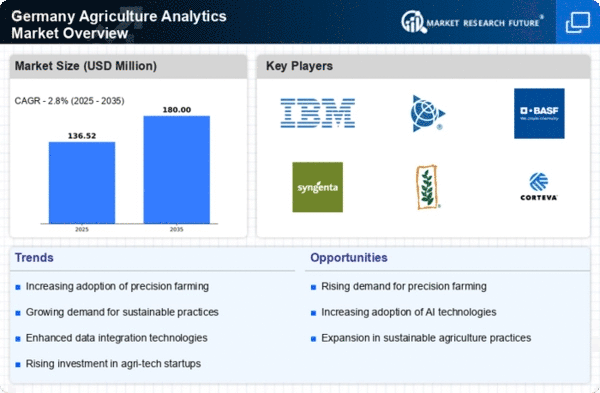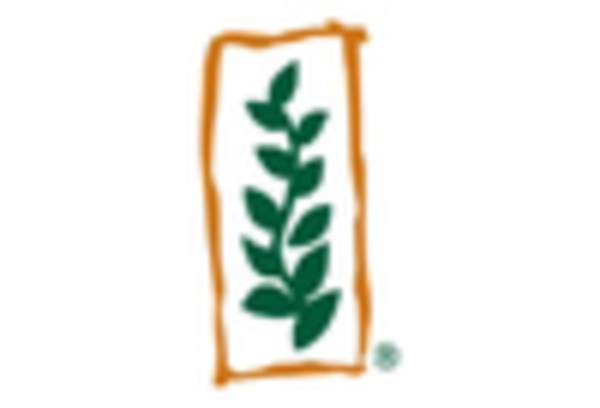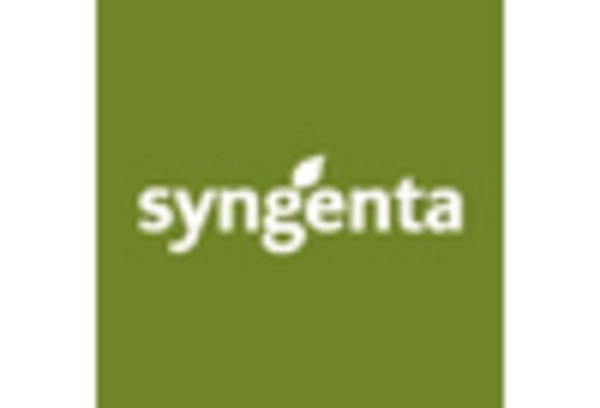Increasing Demand for Food Security
The agriculture analytics market is significantly influenced by the rising demand for food security in Germany. With a growing population and changing dietary preferences, there is an urgent need to enhance agricultural productivity. Analytics tools are being utilized to forecast crop yields, assess soil health, and manage water resources effectively. Reports indicate that by 2025, the demand for analytics solutions in agriculture could increase by 15%, as stakeholders seek to ensure food availability and quality. This trend underscores the importance of data-driven strategies in addressing food security challenges, thereby propelling the agriculture analytics market forward.
Integration of Supply Chain Management
The agriculture analytics market in Germany is also being propelled by the integration of supply chain management solutions. As the agricultural sector becomes more interconnected, the need for data analytics to streamline operations is becoming apparent. By utilizing analytics, stakeholders can enhance traceability, reduce costs, and improve overall efficiency. The market is anticipated to grow by 9% as businesses recognize the value of data in optimizing supply chains. This integration not only benefits individual farmers but also strengthens the entire agricultural ecosystem, thereby reinforcing the importance of the agriculture analytics market.
Rising Awareness of Sustainable Practices
The agriculture analytics market is increasingly driven by the rising awareness of sustainable agricultural practices among German farmers. There is a growing recognition of the need to minimize environmental impact while maximizing yield. Analytics tools are being employed to monitor resource usage, optimize input application, and reduce waste. As sustainability becomes a priority, the market is projected to grow by 11% over the next few years, as farmers seek to implement data-driven solutions that align with eco-friendly practices. This shift towards sustainability is reshaping the agriculture analytics market, making it a vital component of modern farming.
Regulatory Frameworks Promoting Innovation
In Germany, the agriculture analytics market is benefiting from robust regulatory frameworks that promote innovation and digital transformation in agriculture. Government initiatives aimed at enhancing agricultural efficiency and sustainability are encouraging the adoption of analytics solutions. For instance, funding programs and subsidies for technology adoption are becoming more prevalent. As a result, the market is expected to witness a growth rate of approximately 10% annually, as farmers and agribusinesses leverage analytics to comply with environmental regulations and improve operational efficiency. This supportive regulatory environment is crucial for the continued expansion of the agriculture analytics market.
Technological Advancements in Data Analytics
The agriculture analytics market in Germany is experiencing a surge due to rapid technological advancements in data analytics. Innovations in machine learning and artificial intelligence are enabling farmers to analyze vast amounts of data efficiently. This capability allows for improved decision-making regarding crop management, pest control, and resource allocation. As of 2025, the market is projected to grow at a CAGR of 12.5%, driven by the increasing adoption of smart farming technologies. The integration of IoT devices further enhances data collection, providing real-time insights that are crucial for optimizing agricultural practices. Consequently, the agriculture analytics market is becoming indispensable for enhancing productivity and sustainability in the sector.
















